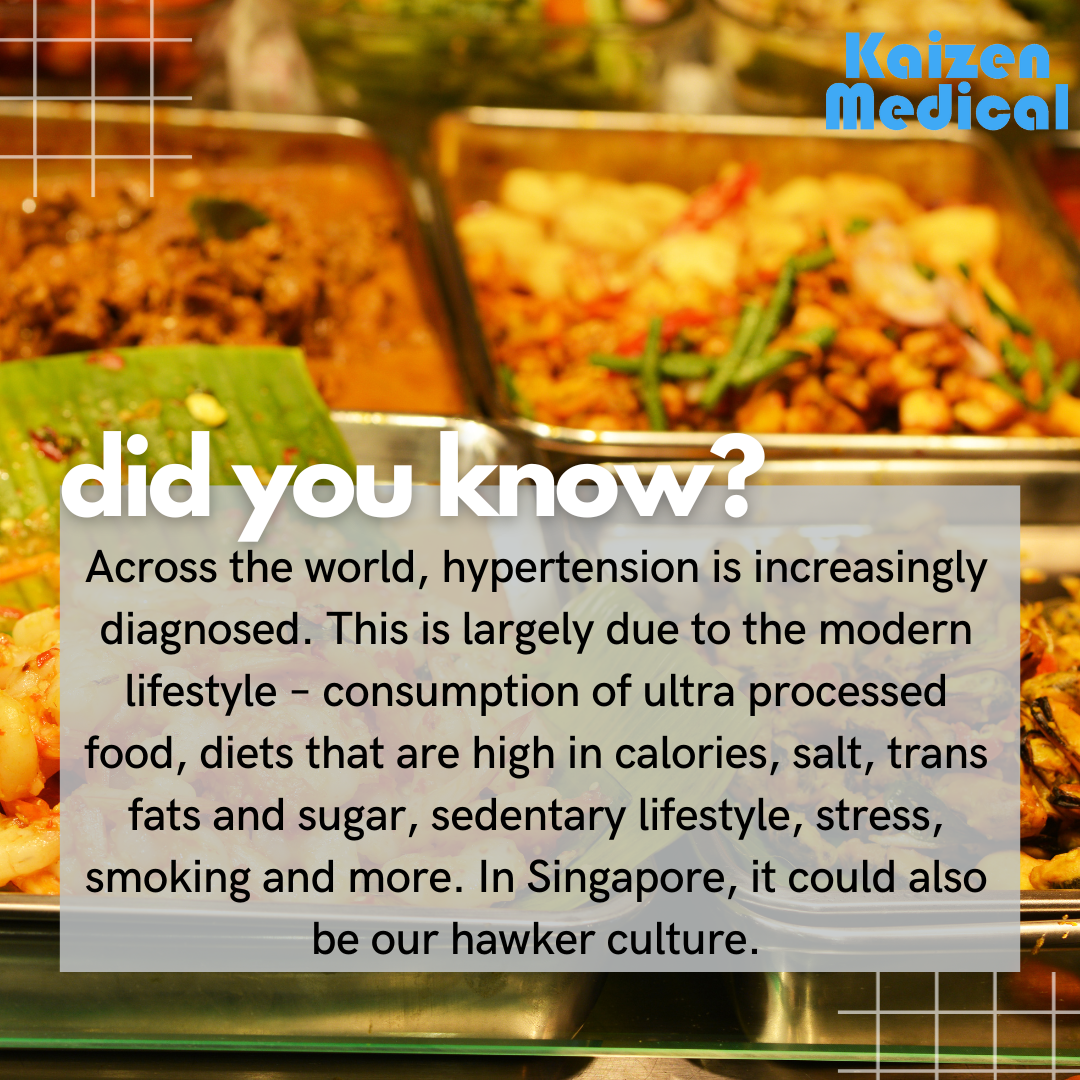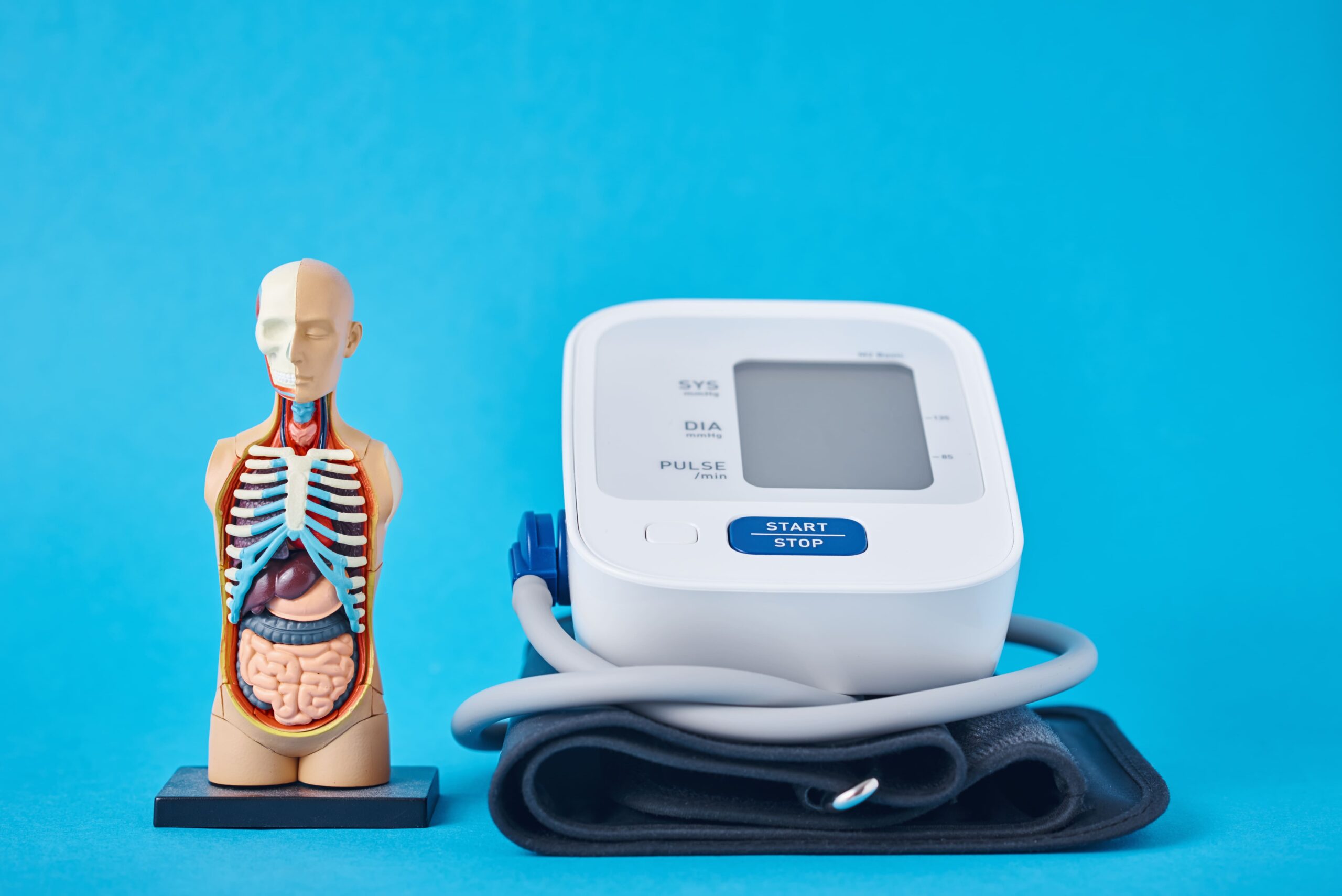It is concerning to note that the findings from MOH’s National Population Health Survey 2022 and HPB’s National Nutrition Survey 2022 shows a near-doubling in the prevalence of hypertension among Singaporeans since 2010.
Also, the daily sodium intake of Singapore residents also increased from 3,480mg in 2019 to 3,620mg in 2022.
Across the world, hypertension is increasingly diagnosed. This is largely due to the modern lifestyle – consumption of ultra processed food, diets that are high in calories, salt, trans fats and sugar, sedentary lifestyle, stress, smoking and more.
In Singapore, it could also be our hawker culture.
Going to the hawker centre for our meals is an integral part of the way for many Singaporeans. In fact, in a poll done by NEA in 2018, 83% of Singaporeans said they visit a hawker centre at least once a week!
Many of our hawker food are high in sodium, and it has been long established that a high sodium diet is not recommended for anyone with hypertension.
What is hypertension?
Hypertension is an insidious, chronic illness.
It is often called the “silent killer” because it does not usually cause symptoms until it reaches severe levels. Without apparent symptoms, hypertension may go unnoticed for a long time. Even in people with known hypertension, the drive to achieve blood pressure control in the absence of symptoms may be low.
Worldwide, hypertension has been called the 50% disease: 50% have it; 50% of those who have it know they have it; 50% of those are receiving treatment, and 50% of treated patients have controlled blood pressure.
In the upcoming Singapore ACE 2023, an individual with systolic blood pressure of >140mmHg SBP and/or diastolic blood pressure of >90mmHg would be classified as hypertensive.
It is also worth noting that only a small fraction of the hypertensive population has an elevation of blood pressure alone, with the majority exhibiting additional cardiovascular risk factors.
Blood pressure and the risk of coronary artery disease mortality, vascular disease mortality and the risk of stroke mortality are highly correlated.
A mere 2mmHg decrease in the mean systolic blood pressure can reduce the risk of coronary artery disease and other vascular disease mortality by 7%, and a 10% reduction in the risk of stroke mortality.
Lowering your blood pressure
Individuals with hypertension, depending on the severity of their condition, are put on different type of medication. Some work by removing excess water and sodium from the body, others work by reducing heart rate or preventing calcium from entering the muscle cells of the heart and blood.
Good lifestyle choices can also help with blood pressure management. Unlike medications, the effect of lifestyle modification may vary more between individual patients compared to the effect of drug treatment. It may take longer to demonstrate visible effects.
There are essentially four pillars of lifestyle modification – salt reduction, weight normalization, regular exercise and stress management – to lower blood pressure.
Reduce salt for better blood pressure
Reducing salt intake plays a significant role in blood pressure management. Salt is often hidden in processed and pre-packaged foods, making it difficult to gauge our actual salt consumption.
A simple guideline is to avoid adding salt to prepared foods, as it is reasonable to assume that salt has already been added during production. Another alternative is to opt for a lower-sodium alternative such as lower sodium salt. Lower sodium salt has typically 40 per cent less sodium than regular salt.
In Asian cuisine, salt is commonly found in condiments and sauces like soy sauce, while Western cuisine often utilizes table salt.
Hypertensive individuals should avoid both and strive to consume more home-cooked meals prepared with reduced salt.
Reduce weight for better blood pressure
There is a close association between obsesity and hypertension. For hypertensive patients who are overweight, weight normalization is crucial. On average, every kilogram of weight loss can reduce systolic blood pressure by 1 mm Hg.
This means that a weight loss of 10 kg may account for a 10 mm Hg reduction in blood pressure, which is equivalent to the approximate effect of standard hypertension medication used at a standard dose.
More exercise for better blood pressure
Engaging in regular exercise is a vital component of lifestyle optimization for blood pressure management. Exercise can take various forms, including weight training, cardiovascular exercises like jogging or swimming, and even enjoyable activities such as dancing. Regular physical activity helps improve cardiovascular health, enhances blood flow, and supports overall well-being.
Less stress for better blood pressure
Stress is a natural and physiological response that can contribute to elevated blood pressure. Hypertensive individuals should prioritize stress management as part of their lifestyle modifications.
Mindfulness exercises have a well-documented positive effect on blood pressure, with studies demonstrating that their application can effectively reduce blood pressure to a similar extent as a standard dose of antihypertensive medication.
Engaging in activities like meditation, deep breathing exercises, or yoga can help alleviate stress and promote relaxation. Additionally, “forest bathing” or spending time in nature has shown to reduce stress levels and can be combined with gentle exercise for added benefits.
Reversing trends with proper lifestyle strategies and partnership
By focusing on the four pillars of salt reduction, weight normalization, regular exercise, and stress management, individuals can take control of their hypertension and improve their overall health.
The campaign the Health Promotion Board will be launching to “encourage industry and F&B operators to pledge to reset sodium levels and roll back sodium content in their dishes to the levels in 2010” will allow Singaporeans to improve their blood pressure without having to quit hawker food completely.
With all hands on deck to counter hypertension, we may well be on the path to better health!
About Dr Adrian Mondry
Dr Adrian Mondry is a Hypertension Specialist accredited by the German Hypertension League in Singapore. He was previously a senior consultant in the department of medicine at the National University Hospital and Ng Teng Fong General Hospital (NTFGH), Dr Mondry has more than 30 years of experience in the field of internal medicine.
Dr Adrian Mondry is recognised for his leadership and contributions in establishing the dedicated hypertension clinic within the National University Health System and fast-track deep vein thrombosis service at NTFGH.
Dr Adrian Mondry is fluent in English, German and French.
About Kaizen Medical
Kaizen Medical is located at Mount Elizabeth Novena Specialist Centre, Suite 11-57.
At Kaizen, we provide in depth health care to patients with multi-organs diseases; tackling undifferentiated presentations that cannot be easily assigned to a single organ.





